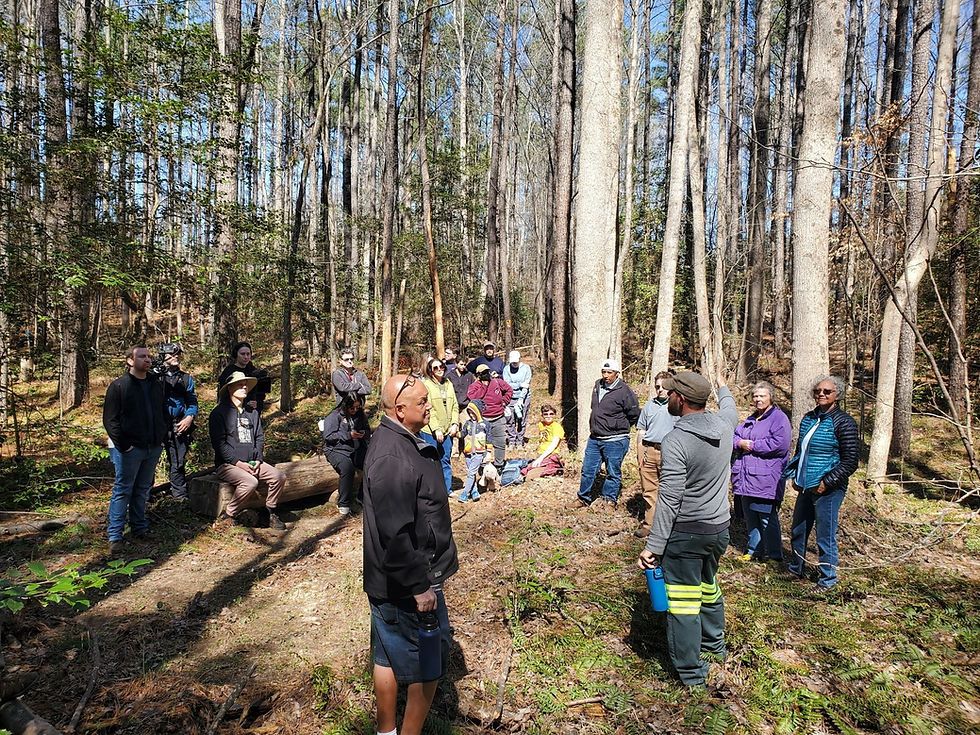Tribal Leadership on an International Stage
- mae8288
- Apr 25, 2025
- 4 min read

We were delighted to field a small but mighty delegation from the Indigenous Conservation Council to the 24th session of the United Nations Permanent Forum on Indigenous Issues. We learned so much and met new friends and leadership from around the world who are advancing Indigenous and natural law, underscoring best practices in consultation and Free, Prior and Informed Consent, and honoring sovereignty and self-determination. We would like to give such a shout out to the Native American Rights Fund's The Implementation Project for providing guidance from applying for accreditation to guiding us in navigating the unique nature of United Nation's proceedings. Thank you to Danielle Pourier, Kris Hoerter, Beth Wright and Noah Lee for all the coaching and support that sustained us through this experience! We appreciate you!

On April 25, 2025, on behalf of the Indigenous Conservation Council, Vanessa Adkins, Tribal Councilwoman of the Chickahominy Indian Tribe entered our resolution into the formal record on the floor of the UNPFII's plenary session. Our remarks and request for engagement in the Chesapeake Bay Program as a means to support the UN Declaration on Rights of Indigenous Peoples will hopefully be included in the UNPFII's final report and be advanced to key member states.
Remarks: Indigenous Conservation Council, 9th meeting of the 24th session of United Nations Permanent Forum on Indigenous Issues
Wingapo, Madame Chair. My name is Vanessa Adkins and I speak to you today as a citizen and Councilwoman of the Chickahominy Indian Tribe. I am honored to address the United Nations Permanent Forum on Indigenous Issues, from the homelands of the Lennape People.
I am providing remarks on behalf of the Indigenous Conservation Council, which is governed by the seven Federally Recognized tribes in Virginia: Chickahominy Indian Tribe, Chickahominy Indian Tribe - Eastern Division, Monacan Indian Nation, Nansemond Indian Nation, Pamunkey Indian Tribe, Rappahannock Tribe, and Upper Mattaponi Tribe. These seven tribes, as well as other Virginia Tribal Nations, are all bound by the Treaty of Middle Plantation of 1677, which established our treaty rights with the British Crown 99 years prior to the founding of the United States of America.
These rights were most recently recognized through federal petition and federal law in 2016 and 2018. Though we were among the first in what is now known as the United States to have contact with European settlers, it took over 400 years for the federal government to recognize our sovereignty. We assert our sovereignty and self-determination as upheld by the United Nations Declaration on the Rights of Indigenous Peoples, joining other Indigenous Sovereign Nations from around the world today in this call.
Our homelands are located in the Chesapeake Bay watershed, recognized as one of the world’s largest and most studied estuaries. For decades, the Chesapeake Bay Program Partnership has brought together governments, which include the state of New York, the Commonwealth of Pennsylvania, the State of Maryland, the State of West Virginia, the State of Delaware and the Commonwealth of Virginia, as well as the District of Columbia, the US Federal Government, and the Chesapeake Bay Commission to collaborate to protect this ecosystem.
Where are Tribal Nations, who are now recognized under US law as political and legal sovereigns, in this world-class Agreement? Tribal Nations are entirely absent from the governance and decision making of this initiative. We are losing our wetlands, forests, and rapidly facing rising waters which threaten our homelands and all relations. These challenges demand Indigenous Knowledge to overcome.
The Governing Board of the Indigenous Conservation Council passed a resolution on January 15, 2025 entitled, A Declaration of Tribal Nations as Sovereign Governments Committed to the Protection and Restoration of Ancestral Lands and Waters through the Chesapeake Bay Program Partnership.
This resolution seeks to correct the exclusion of Tribal Nations given that the Executive Council of the Chesapeake Bay Partnership has agreed to update the Agreement in 2025.
Our declaration emphasizes three core imperatives:
1. To create a signatory status for Tribal Nations through our intertribal consortium, the Indigenous Conservation Council, to recognize our sovereignty in the Chesapeake Bay Watershed Agreement.
2. To establish and fund a new Indigenous Guardians program for the region to support the capacity of Tribal Nations to protect our ancestral landscape and fully engage with the Partnership.
3. To ensure that Indigenous Knowledge is viewed as equal and on par with Western science in the Partnership given our thousands of years of expertise caring for our homelands.
I am grateful for your attention today as I bring forth this call to action.
Kenah.




Comments